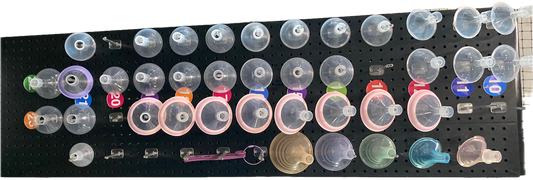
You may wonder if you need a class for breastfeeding?
Share
A breastfeeding class prepares parents for the fundamentals of breastfeeding.
In an ideal world, you would have breastfed, watched your siblings breastfeed and all your sisters, aunties, co-workers and friends would have taught you a bit about normal breastfeeding throughout your life.
In a traditional culture, your mother, or mother-in-law, would move in after your birth for a month or two, bringing her knowledge about breastfeeding. She would prepare traditional foods to support lactation and provide plenty of mompower to keep your little household running smoothly during your recovery.
In lieu of that, a two-hour course will cover the fundamentals of breastfeeding.
It's like a roadmap with some preferred destinations along the way. It will point out where to get services and food. It will help give you a good idea how to start, even if your mother is coming to live with you.
Prepare during pregnancy for breastfeeding.
You will learn how to receive a breast pump through insurance and what you need to do, so it's ready to go if you need it.
Pregnancy is also the time to talk to your employer about your plans to return to work and what kind of accommodations you will need if you're pumping. In New York State, the law protects your right to pump at work until your child is three years old.
Somebody probably told you how to toughen your nipples by rubbing them with a washcloth. Rather than doing this, learn to massage your breasts to wake them up. In a breastfeeding class, you will learn about expressing your colostrum prenatally so you have supplemental food, should your baby need it in the hospital.
And you will hear about how wonderful and awful, breastfeeding can be.
Beginning breastfeeding
The first five days are challenging and many parents are overwhelmed by their new responsibilities. You will learn how to negotiate the first hour of your baby's life and why it's important to keep your baby on you skin-to-skin, even though not every hospital allows it. The law protects your rights to have this time, and you will learn how to advocate for it.
In addition, you may not have access to a Lactation Consultant in the hospital because either your schedule and hers don't line up. You will watch and receive a short list of excellent videos that can help you through this time.
Common problems
In the first five days, there are four common problems: sore nipples, engorgement, baby not latching well, and worrying that you don't have enough milk.
All of these problems have simple solutions that are not commonly taught by hospital staff, but are covered in a Beginning Breastfeeding class. For instance, simply leaning back into a reclining position can make sore nipples vanish, and cause babies to open their mouth wide.
Solving breastfeeding problems in a hospital often takes breastfeeding away from mothers and substitutes it with pumping and formula. Beginning Breastfeeding classes not only offer you simple solutions that keep you breastfeeding, but also teach how to advocate for your baby's needs.
How to know when you need help
There are four barriers that keep women from getting the help they need:
- Stubbornness and the belief that they can power through it.
- Not knowing where to get help, or what kind is needed.
- People or places where you might get help don't actually exist in your community.
- Not knowing common warning signs and red flags for impending doom.
Weaning will happen whether you want it or not.
It may seem strange to talk about ending breastfeeding before it's even begun, but it's important. Weaning always takes time -- weeks or months, not days. Sudden weaning can make you painfully miserable, or even sick. You will learn strategies for every age that weaning might happen.
Support groups are an important part of success.
The easiest way to prepare yourself for breastfeeding is to attend breastfeeding support groups while you are still pregnant. It's also important is to talk on the phone or meet with at least one International Board Certified Lactation Consultant (IBCLC.) Many IBCLCs facilitate their own breastfeeding support group.
When you are surrounded by women who breastfeed, they can cheer you on and model what's coming up in your future. When you don't have a perspective from hearing shared experiences, its easy to magnify your problems in your head. And that leads to anxiety, stress, feeling discouraged and not meeting your breastfeeding goals.
A breastfeeding class will have information on local and online support groups.
How do partners and grandparents fit into breastfeeding?
While you might be the rebel of the family already, it's a lot easier if your significant-other and parents support your breastfeeding.
Breastfeeding involves some bare breasts in the beginning. You will probably feel self-conscious, and the last thing you need is family members acting all judgmental, self-righteous and shocked. Or making snarky comments about boobs. Or trying to be helpful by suggesting you give the baby a bottle.
Beginning Breastfeeding prepares you with what and how to tell them and they can even come to your breastfeeding class so you are all on the same page.
Remember, this is your baby.
You are the parents, and Gramma is not. She may have some feelings about this, but she had her baby back in the day, and now, she can show you some respect!
Selecting a breast pump and essentials if you are returning to work.
Search your insurance company website to see what they offer in breast pumps and how to receive one. Insurance companies and pumps all work a little differently and it can take some time, so don't leave it to the last minute.
If you need a pump in the hospital, a hospital grade pump will be provided for you. You may wish you had your pumping bra, though.
Read reviews about different pumps and how to select the right one for you.
Pacifiers, safe bottle feeding, & suckling
When a person of authority insists that you stop breastfeeding even though you are just learning how to breastfeed, and you aren't ready, you need a solution. There is a time and a place for pacifiers and bottle feeding, but in the beginning, there is almost always a breastfeeding solution, if you want to keep breastfeeding.
- Pain can be reduced greatly with excellent positioning.
- Breast compressions can replace pumping and keep babies swallowing even while they doze.
- A spoon can replace a bottle.
- Breastfeeding can replace a pacifier.
- Keeping a baby close can keep them from sleeping deeply
A Beginning Breastfeeding class gives you a foundation for what to expect. It starts to prepare you for how learning breastfeeding will be wonderful, amazing, empowering and challenging.
And it gives you resources, so that when you need help, they are already in your phone.







